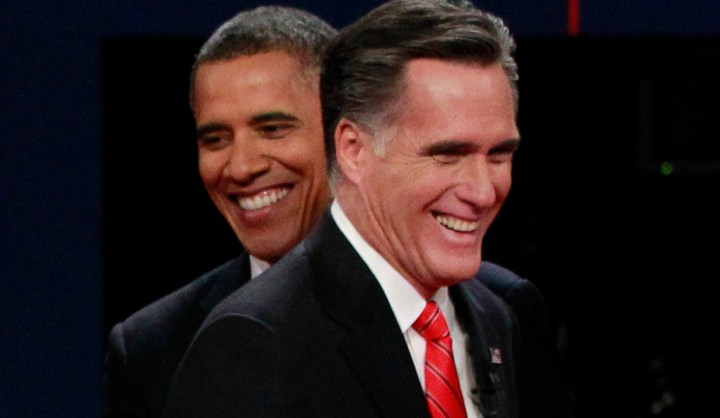World
US 2012 debate No 1: Battle of the sound bite stars

On Wednesday evening, President Barack Obama and challenger Mitt Romney and squared off in a made-for-television program that masqueraded as a candidates’ debate. Romney demonstrated he could carry the battle to Obama – a man who seemed strangely passive and lacklustre through most of the evening. By J BROOKS SPECTOR.
The event, broadcast live across the US and around the world from the campus of the University of Denver, was moderated by Jim Lehrer, long-time veteran lion tamer of presidential debates and news anchor of the Public Broadcast System’s News Hour.
Well before the debate began, both candidates’ organizations had been engaging in a sustained effort to lower expectations on the prospects for an overpowering, masterful knockout by their respective candidates. If that was the core task, and if neither candidate was lying prone on the mat by the end, Mitt Romney passed one key test for a challenger against an incumbent.
As veteran presidential political advisor (for both parties) turned television network talking head, David Gergen said bluntly of Obama just after the debate ended, “He lost.” Score this one to Romney on points – through pretty much every round. An immediate post-debate poll quoted on CNN said Obama “got spanked tonight.”
Saying that is not going to make Democrats very happy. Throughout the past two weeks, they had been riding high and hard on the back of Romney’s now-infamous “47%” remark and the increasingly public squabble among Republicans over disarray in the Romney campaign’s messaging and strategy. Now – at least until the next debate in this four-debate series (three between presidential candidates and one between the two vice presidential candidates) – Republicans will draw sustenance from Romney’s performance, especially as it seemed to show a newfound ability to connect with audiences – and potential voters. Romney did a particularly effective job of putting Thurston Howell III back in the closet, at least until the next debate, perhaps.
Four immediate takeaways (there will, of course, be many more after the commentators have thoroughly mulled over the event for a day or so):
First of all, it is clear Romney’s debate prep sparring partner, Senator Rob Portman, did a much better job in sharpening Romney’s line of attack than Senator John Kerry did for Obama. Watch for a whispering campaign from the spinmeisters in the Obama campaign that their candidate tried to talk with the American people, rather than match the challenger punch for punch. Oh, and they’ll be much better prepared for the town meeting “debate” and the face-to-face debate on foreign policy, maybe even calling in someone like Bill Clinton for a bit of last minute coaching.
Second takeaway: Viewers saw a president who didn’t take the fight to Romney and on to the people, standing strong on his administration’s record. This was in contrast to a challenger who found a way to thread his proposed policies together into an increasingly coherent narrative.
Third takeaway, of course, is that viewers also heard some of the same tired bromides, throwaway lines or just plain statements of factual inaccuracy mostly, but not entirely, from the Romney camp. Throughout the evening, watchers kept hearing charges Obama was cutting over $700 billion from Medicare; that the Obamacare healthcare measure has some kind of actual committee (picture: a bunch of guys in white lab coats sitting around a table blackballing someone’s kidney operation) that will tell people which medical treatments they could get for grandma; and that the Obama administration will make massive cuts in military spending. All of these came with little in the way of effective rebuttal from the president. It was worthy of note, since he had previously used a thoroughly developed attack/defence line for each of these points.
Fourth takeaway: Romney managed to bob and weave his way through the often-competing versions of his own taxation and budget plans in a way that seemed, at least on the surface, reasonably consistent.
The Democrats were clearly less than pleased with their champion’s performance. Just minutes after the debate broadcast was over, an email “signed” by Obama had already hit millions of email inboxes, reading, “I hope I made you proud out there explaining the vision we share for this country. Now we need to go win this election – the most important thing that will happen tonight is what you do (or don’t do) to help in the little time we have left.” (Translation – I goofed tonight, now help me make the last four weeks and a bit count.)
This event, more appropriately termed a live studio encounter, was not really a debate at all. The format ostensibly called for the moderator to ask questions and have the candidates respond on each point at issue for two minutes apiece, followed by further responses. But Lehrer quickly ceded control over the tempo of the event to the candidates. Commentary on this meeting may well begin to argue for a return to an old-style debate where candidates get enough time to build a case for their respective candidacy and big enough chunks of time to attack their opponent’s case in depth.
The Lincoln-Douglas debates of 1858 – often held up as the gold standard and measuring stick for every debate thereafter – actually gave the respective candidates many minutes to develop their ideas and lasted for hours. Maybe the American population no longer has the patience for such things, but sufficiently important deserve a much more thorough interrogation than they have gotten so far. The specifics of tax policy, budgetary plans, health care reform (reining in the continuing rise in health care as a percentage of the nation’s GDP is a critically important issue for the future) and how to reenergize the country’s job creation machinery have yet to be dissected in depth in this campaign, and the country is the poorer for it.
There is still a little more than a month left, but no one should hold their breath waiting for such a beam of light to cut through the clouds to illuminate the issues.
Despite all the instant analysis, and even the fact that three debates remain, two important facts must be kept in mind in evaluating their likely impact on voting. The first is the rise of social media and whether this year’s debate audience will match the nearly 53 million viewers who watched the first debate between Obama and John McCain in 2008, or whether many people will take their cues on their choice from somewhere else. Moreover, unlike previous years, a growing number of Americans will use advance voting to cast their ballots through October, rather than wait until Election Day on the first Tuesday in November. Some estimates say that as many as 40% of all voters may do so before hearing all the debates. How that reshapes the electoral map remains a key – unanswered – question. DM
Read more:
Presidential debate: Round One goes to Romney, by many measures in the LA Times;
Obama and Romney, in First Debate, Spar Over Fixing the Economy in The New York Times.
Photo: President Barack Obama (L) and Republican presidential nominee Mitt Romney share a laugh at the end of the first presidential debate in Denver October 3, 2012. REUTERS/Jason Reed


















 Become an Insider
Become an Insider